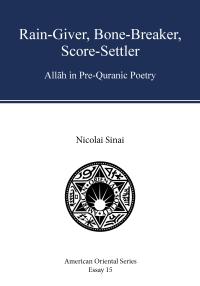Rain-Giver, Bone-Breaker, Score-Settler: Allāh in Pre-Quranic Poetry
Keywords:
Allah, pre-Quranic poetry, Quran, late antiquitySynopsis
Just as quranic scholars have over the last decade honed their facility in utilizing Syriac literature, so the field stands in need of relearning to use poetic material as a valid, albeit in some respects recalcitrant, resource for the Quran’s historical contextualization. The present essay is an attempt to contribute to this by reassessing how poetry, and more briefly the epigraphic record, can help us reconstruct pre-quranic Arabian notions of the deity whose name is allāh. After some reflections on the relationship between the word allāh and the expression al-ilāh, “the god” or “the deity,” the essay succinctly examines what we can learn about Allāh’s status and functions from our chronologically earliest sources—Ancient North Arabian inscriptions—which are conventionally, though uncertainly, estimated to take us up to ca. 400 CE. Allāh’s relative lack of prominence in the epigraphic record is thrown into particular relief when juxtaposed with the beliefs about Allāh that the Quran ascribes to its pagan opponents. The study then turns to evidence from pre-quranic poetry, which in many respects aligns with the beliefs about Allāh that were held by the Quran’s pagan adversaries. Such mutual corroboration confirms that the poetic record does in fact provide us with nonanachronistic insights into pre-quranic notions of Allāh. The concluding section considers the historical context that may help us explain Allāh’s significant surge in prominence between the Ancient North Arabian inscriptions, on the one hand, and the poetic record and the Quran, on the other.


